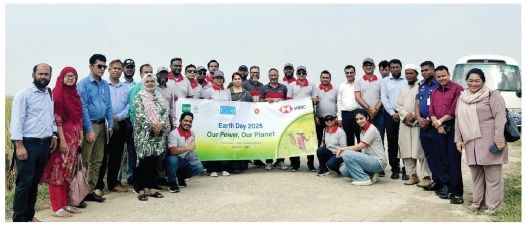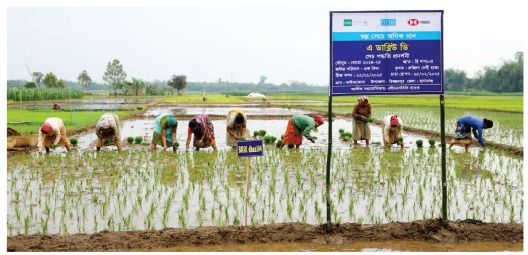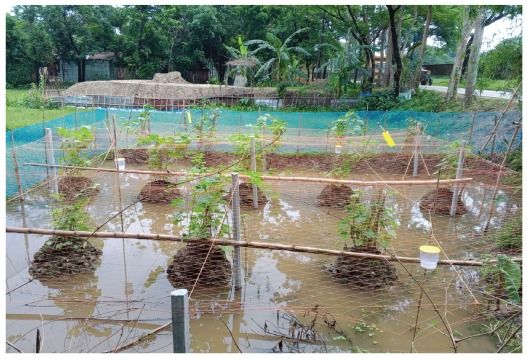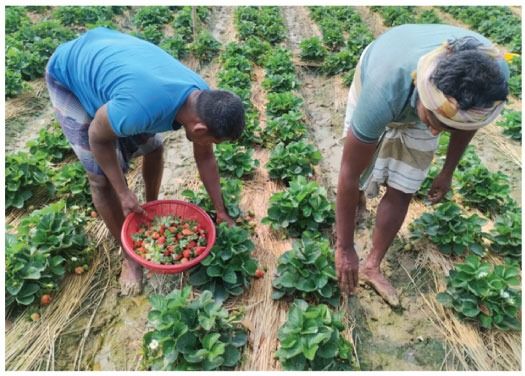- info@ficci.org.bd
- |
- +880248814801, +880248814802
- Contact Us
- |
- Become a Member
- |
- |
- |
- |
- |


In Bangladesh, agriculture forms the backbone of rural livelihoods where water is both a vital resource and a growing challenge. From coastal salinity intrusion to erratic rainfall, flooding, and droughts, the country's agricultural sector is vulnerable to climate-induced water stresses. To tackle with environmental sustainability and community resilience, HSBC continues its philanthropic support to agricultural initiatives across diverse ecological landscapes in Bangladesh. These projects not only aim to enhance productivity but also ensure sustainable water management practices, helping communities adapt to the realities of climate change.
Coastal Resilience through Mangrove-Based Aquaculture
In the climate-vulnerable coastal region of southwestern Bangladesh, the "Promotion of Climate Resilient Agriculture in the Coastal Landscape of Bangladesh through Integrated Mangrove-Based Aquaculture" project offers a groundbreaking model to combat rising salinity and waterlogging. By integrating mangrove restoration with shrimp farming, the project restores the natural hydrological balance, protects freshwater resources, and curbs salinity ingress. This nature-based solution leverages the ecosystem services of mangroves-regulating water flow, buffering storm surges, and enhancing soil and water quality-while creating livelihood opportunities through sustainable aquaculture.

Innovations in Haor Wetlands
The Haor region, known for its unique wetland ecosystems and seasonal flooding, presents its own set of water management challenges. Here, HSBC has partnered with International Rice Research Institute (IRRI) to implement the Climate Smart Rice Value Chain (CS-RVC) project. The initiative pilots "Alternate Wetting and Drying (AWD)❞ irrigation across five model villages, tackling both the summer water crisis and high greenhouse gas emissions from traditional rice cultivation. By comparing yields, water usage, and production costs between AWD and conventional methods, the project is generating vital data to drive the future of water-efficient agriculture in wetlands.
AWD is a water saving technology used in rice cultivation. Instead of continuously flooding rice fields, farmers allow the soil to dry to a certain depth (usually 15 cm below the surface) before re-irrigating. This cycle of drying and re-wetting is repeated throughout the growing season.

Water Management in Flood and Drought-Prone Dewanganj
In the water-stressed region of Dewanganj, Jamalpur, HSBC is supporting the "Climate Smart Agriculture through Adaptation Clinic" project, in partnership with BRAC. The initiative addresses both flooding and drought by equipping farmers with innovative techniques. Raised beds improve drainage and crop resilience during floods while retaining moisture in dry spells. Strip mulching conserves soil moisture and reduces evaporation. A notable advancement is the introduction of solar-powered irrigation pumps, replacing diesel engines and offering a clean, cost-effective irrigation solution. These multifaceted strategies are strengthening farmers' capacity to manage water wisely, increasing both productivity and resilience.
Efficient Irrigation in the Barind Tract
In northwestern Bangladesh's Barind Tract, where water scarcity limits agricultural potential, the Climate Resilient Agricultural Advancement in Bangladesh (CRAAB) project, led by the Sustainable Agriculture Foundation and DASCOH Foundation, promotes smart irrigation practices. A key intervention is the use of Alternate Wetting and Drying (AWD) for rice cultivation-a method that reduces water use without compromising yields. The project also trains farmers in laser leveling, a precision technique that ensures uniform water distribution. These water-saving technologies are making rice farming more sustainable in one of the country's driest agricultural zones.

Smart Strawberry Cultivation
Facing the dual challenges of water scarcity and declining profitability from traditional rice cultivation, farmers in Bangladesh's Barind region have embraced a transformative approach by shifting to strawberry farming. Supported by the Climate Resilient Agricultural Advancement in Barind (CRAAB) project, this transition has proven both environmentally and economically beneficial. Strawberries require significantly less water than rice-reducing groundwater extraction by up to 88%-and offer higher market value, fetching premium prices between Tk 300-450 per kilogram at the farm gate. To further enhance water efficiency, farmers adopted mulching techniques, which help retain soil moisture and reduce irrigation needs. Additionally, CRAAB's market linkage workshops connected these farmers to national suppliers, ensuring stable and profitable sales channels. This strategic shift not only addresses environmental concerns but also empowers local communities with sustainable livelihoods and improved resilience to climate challenges.
Wellness Wells: Clean Water at the Doorstep
Access to drinking water is another pressing concern for rural communities. In Barind Tract, the "Wellness Wells: Doorstep Drinking Water Initiative" is bringing safe water directly to households. Through community- managed infrastructure, potential rainwater harvesting, and aquifer recharge systems, this project reduces the burden on women and improves overall well-being. By ensuring a sustainable and reliable water source, the initiative enhances health, sanitation, and gender equity alongside agricultural sustainability.
Water is at the heart of sustainable agriculture and climate resilience. HSBC's support for water-resilient agricultural initiatives across Bangladesh is helping farmers and communities adapt to changing conditions-through efforts such as mangrove restoration, smart irrigation, and clean drinking water systems. These projects reflect the philanthropic support of the bank to resilience and sustainability. As Bangladesh faces the growing impacts of climate change, such initiatives is expected to improve the future of food, water, and livelihoods.





